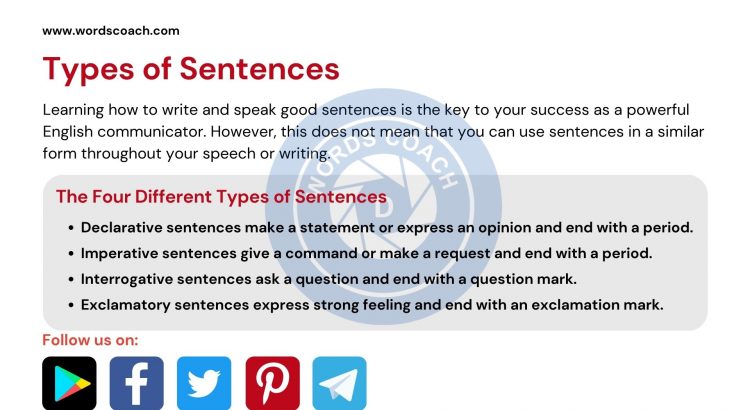Learning how to write and speak good sentences is the key to your success as a powerful English communicator. However, this does not mean that you can use sentences in a similar form throughout your speech or writing.
The Four Different Types of Sentences
There are four main types of sentences: declarative, imperative, interrogative, and exclamatory.
Declarative sentences
Declarative sentences make a statement or express an opinion and end with a period.
Example: “The sky is blue.”
The declarative sentence that makes a statement, provides a fact, offers an explanation, or conveys information. They tell us something. They give us information, and they normally end with a full-stop/period.
Declarative sentences can be positive or negative.
subject + verb…
Examples:
- She doesn’t study German on Saturday.
- We watched TV last night.
- We did not watch TV last night.
- I do not like coffee.
- George brushes her teeth twice a day.
Imperative sentences
Imperative sentences give a command or make a request and end with a period.
Example: “Please close the door.”
Imperative sentences give a command. They tell us to do something, and they end with a full-stop/period (.) or exclamation mark/point(!).
The usual word order for the imperative sentence is:
base verb…
Examples:
- Leave the book under my doormat.
- Don’t give her coffee.
- Play with intensity and courage.
- Turn left at that intersection.
- Please open with care.
Interrogative sentences
Interrogative sentences ask a question and end with a question mark.
Example: “What is your name?”
Interrogative sentences ask a question. They ask us something. They want information, and they always end with a question mark.
The usual word order for the interrogative sentence is:
(wh-word +) auxiliary + subject + verb…
Examples:
- Are you feeling better?
- What do you believe?
- What sort of nation might you want to live in?
Exclamatory sentences
Exclamatory sentences express strong feeling and end with an exclamation mark.
Example: “I can’t believe it!”
Exclamative sentences express strong emotion/surprise an exclamation and they always end with an exclamation mark/point (!).
The usual word order for the exclamative sentence is:
What (+ adjective) + noun + subject + verb
How (+ adjective/adverb) + subject + verb
Examples:
- You are such a liar!
- What an exciting movie it was!
- He is such a kind person!
- How he lied!
- But don’t forget what I said!


